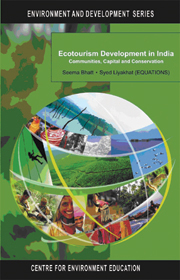Book contents
- Frontmatter
- Contents
- About the Authors
- Preface
- 1 Tourism and Ecotourism – General Introduction
- 2 International Legal and Policy Frameworks
- 3 National Legal and Policy Frameworks
- 4 Ecotourism: Voices of Dissent
- 5 Ecotourism: Some Successful Initiatives
- 6 Analysis and Discussion
- 7 Towards Sustainable Ecotourism
- 8 Ecotourism: Grounds for Protest
- 9 Ecotourism: Glimpses of Successful Initiatives
- Bibliography
7 - Towards Sustainable Ecotourism
Published online by Cambridge University Press: 05 November 2011
- Frontmatter
- Contents
- About the Authors
- Preface
- 1 Tourism and Ecotourism – General Introduction
- 2 International Legal and Policy Frameworks
- 3 National Legal and Policy Frameworks
- 4 Ecotourism: Voices of Dissent
- 5 Ecotourism: Some Successful Initiatives
- 6 Analysis and Discussion
- 7 Towards Sustainable Ecotourism
- 8 Ecotourism: Grounds for Protest
- 9 Ecotourism: Glimpses of Successful Initiatives
- Bibliography
Summary
It is evident that tourism is growing rapidly worldwide, providing economic, environmental and social benefits. Tourism benefits financially through its multiplier effect, creates employment and brings about regional development. It also cultivates tolerance and encourages knowledge of different cultures, while aiding in the preservation of heritage and the environment.
However, recent trends within tourism development in the country have raised several concerns about the adverse impacts of tourism. Government policies seldom acknowledge the negative fallouts of tourism development and continue to render an open invitation to tourists and investment in tourism. Tourism depends heavily on natural and human resources and its inroads into protected areas and untouched zones have often been at high costs. A market-driven model of tourism development that has privileged industry and tourists' needs over local people's interests often leads to privatisation of common property resources for exclusive use by industry and displacement of local communities to make room for tourism establishments. Low levels of participation in the formal, more lucrative tourism industry and reduced access to resources have resulted in paltry benefits to local communities.
Uncontrolled and unregulated tourism growth, often based on shortterm priorities, invariably results in unacceptable impacts that harm society and the environment. In essence, tourism development today has raised serious questions as to who its real beneficiaries are. This has led to the emergence of a more sensitive form of tourism, which aims at minimising these costs and maximising benefits.
- Type
- Chapter
- Information
- Ecotourism Development in IndiaCommunities, Capital and Conservation, pp. 128 - 134Publisher: Foundation BooksPrint publication year: 2008



